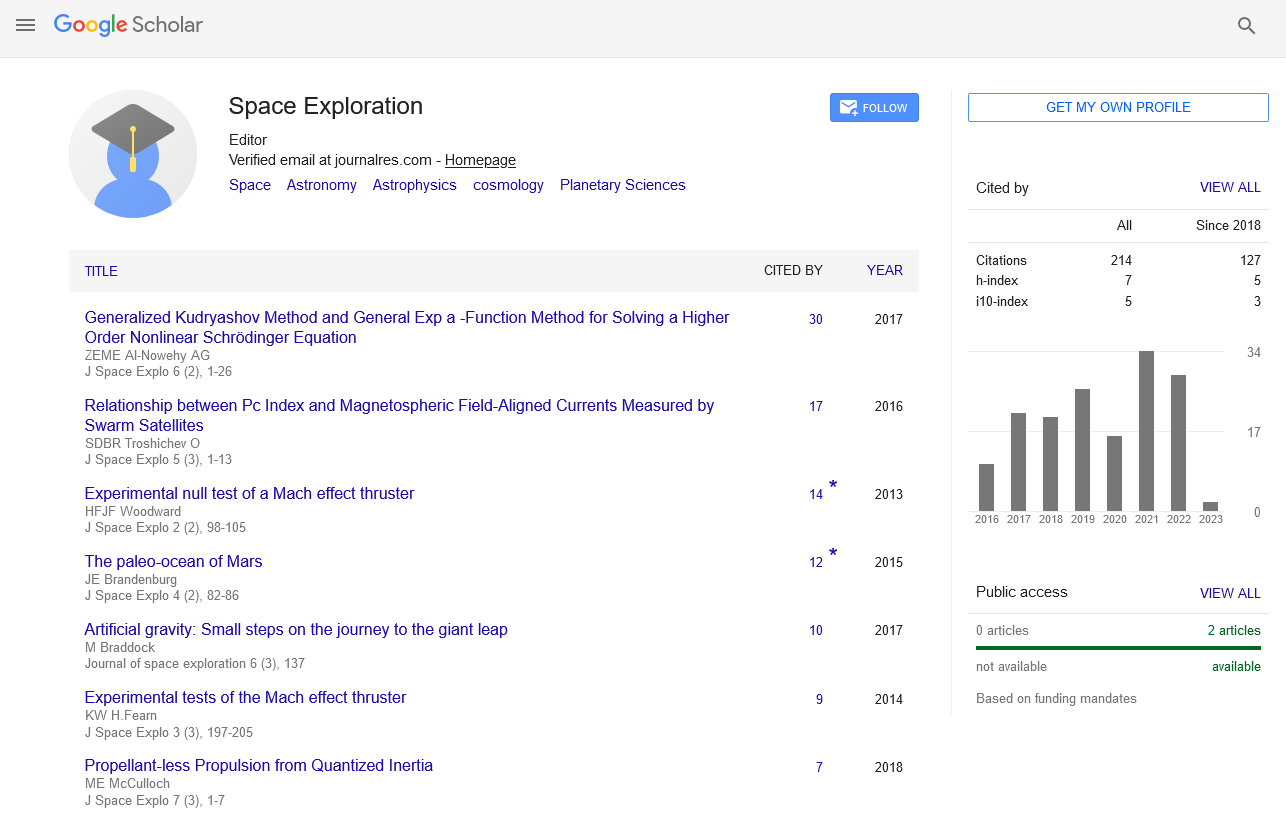Editorial
, Volume: 11( 10) DOI: Doi: 10.37532/2319-9822.2022.11 (10).241The Prime Obstacle in Learning Science and Engineering
- *Correspondence:
- Matthew M. Radmanesh ECE Dept., California State University, Northridge 18111 Nordhoff St.,Northridge, CA 91330, E-mail: matt@csun.edu
Received: October 12, 2022, Manuscript No. tsse-22-76994; Editor assigned: October 13, 2022, PreQC No. tsse-22-76994 (PQ); Reviewed: October 25, 2022, QC No. tsse-22-76994 (Q); Revised: October 26, 2022, Manuscript No. tsse-22-76994 (R); Published date: October 29, 2022. Doi: 10.37532/2319-9822.2022.11 (10).241
Citation: Radmanesh M.M .The Prime Obstacle in Learning Science and Engineering, J Space Explor.2022; 11(10).241
Abstract
Education in fields such as science and engineering is a very delicate subject, which requires awareness of several mental factors. These factors, when ignored or neglected, can bring about a very distasteful learning environment for the students at large. These factors include such things as peer pressure, fear of failure, lack of self-esteem, lack of goals, course format, poor learner experience, negative past experiences, personal mindsets, lack of focus and concentration, emotional factors, personal resistance, etc. However, there is a chief factor amongst these, which is deadly if not dealt with properly, and that is the exact definitions for the nomenclature of the subject at hand.
Introduction
Education in fields such as science and engineering is a very delicate subject, which requires awareness of several mental factors. These factors, when ignored or neglected, can bring about a very distasteful learning environment for the students at large. These factors include such things as peer pressure, fear of failure, lack of self-esteem, lack of goals, course format, poor learner experience, negative past experiences, personal mindsets, lack of focus and concentration, emotional factors, personal resistance, etc. However, there is a chief factor amongst these, which is deadly if not dealt with properly, and that is the exact definitions for the nomenclature of the subject at hand. An awareness and understanding of these factors (especially an important one, which is usually undetected) combined with an implementation of their proper remedy in actual practice can create an extremely positive environment for learning and comprehension of scientific or engineering subjects
The importance of nomenclature
ny scientific subject, when communicated verbally or in writing is put into a language format, which at once makes it quantized. In other words a concept as fluid and as continuous it may be in one’s mind, the moment it is presented for communication to others has to be transformed into a language form, which is made up of information quanta called “words”. This transformation process essentially makes any “scientific concept” no longer continuous but rather quantized or pulsed (borrowing a term from electrical signals nomenclature).
The basic building blocks (or quanta) of information of any science, are its technical terms or terminology. Each technical term (or quantum of information) carries with it an exact package of information, which is embodied in its definition. Therefore, in examining any scientific subject, the first point of encounter is with its specialized words, which are a series of precisely defined technical terms. The collective sum of these specialized words is commonly referred to as “nomenclature”.
The reason for nomenclature
The full mental grasp of each of these specialized words by one who is traveling on the road to knowledge is an important milestone in one’s progress and ascent to higher levels of realization and understanding [1-3].
Needless to say, neglecting to understand (or worse, misunderstand) these essential terms could wreak havoc in one’s mind and prove to be disastrous in one’s progress along the road to knowledge. Some of the consequences of such a neglect and/or misunderstanding is loss of interest, lack of focus and a general state of dislike and confusion leading to gross misapplications.
The important point to grasp here is that the pioneers and founders of a scientific field of study felt that it was necessary to invent these terms and they, themselves, communicated their discoveries, laws and principles using these same very terms.
A grave mistake
Many years later, a student of science or engineering comes along and tries to learn the subject by reading about the laws and principles of the subject, which the pioneers have earlier discovered and written about with tremendous clarity. “Without student's full comprehension and mastery of the specialized words and technical terms, what are the odds of a successful communication with any given subject?” one may surmise. The obvious answer is nil [4-6].
For any student of science to come a classroom and try to understand the same much discovered laws and principles with a complete disregard for the terms, is extremely adventurous to say the least!
As obvious as this observation may seem too many, yet there are a great many number of students who have no traffic with a technical dictionary while studying a technical subject. It can be seen that they are inviting nothing but a great amount of complexity of thought and perplexity of application into their studies, unknowingly
The basic truth
It is a well-known fact that having an inadequate comprehension of the terminology is one of the leading causes of confusion and misunderstanding of a subject. Therefore, the terminology of a science forms an important part of the subject and mastery of any subject requires mastery of its terminology along with its accurate definitions. This means that a student, when faced with a stream of information regarding a scientific concept, needs to fully grasp each quantum of information (i.e. each technical term), with the exact definition that was originally intended by its pioneers or authors, before the whole scientific concept is grasped.
So the effective method that one could become very successful in the study of a science is through the full comprehension of its nomenclature with the help of a technical dictionary.
In other words, one enters through the gateway of a science by comprehension of its very first term and continues on with full attention on the definitions of its nomenclature throughout the course of study.
There is no other road to a higher plateau of knowledge about a subject than a mastery of its nomenclature. This paves the road to the realm of “critical thinking” on a subject, which is a highly desirable state in a scholar or scientist
The nomenclature axiom
Having the above preamble in mind, we can see that one successfully enters the gate of a science through the comprehension of its language, which is made up of quanta of information (i.e., scientific terminology).
This concept can be actually expressed by the following axiom, which succinctly describes our conclusion:
In any scientific field of study, the comprehension of specific and exact definitions of relevant terms are essential if one intends to apply the subject successfully and/or communicate the postulates, principles, laws, observations, problems, and solutions to others.
FIG.1. below shows how concepts are first coded and condensed into terms and symbols for effective communication. Moreover, the meaning of the terms and symbols must be known at the receipt point for proper decoding and comprehension of the intended concepts
The solution
Knowing well that terminology plays a superior role in one's comprehension of a subject, precautionary measures should be taken throughout one’s study of a science to pay special attention to new terms by defining them as they are introduced. Additionally, other than technical dictionaries one could often consult glossaries of important technical terms as provided at the end of the most textbooks
Definitions of terms
There are several ways a technical term may be defined. For example, the term "capacitor" in the field of electronics can be defined in any one of the following ways, which are all correct:
a) A device, which is composed of two conducting plates separated by a dielectric (such as air, paper, etc.), designed to store a definite amount of charge (Descriptive Definition).
b) A device, which stores electric energy very much like a spring, which can store mechanical energy (Associative Definition).
c) A device used for storing electric energy, unlike a resistor, which is used for dissipating energy (Comparative Definition).
d) A device used in an electric circuit to block the DC signals from traveling to other parts of the circuit but allowing AC signals to go through (Action Definition).
These four ways of defining words show how a technical word can be defined in more than one way for a total conceptual understanding of the subject at hand.
Conclusions
Combining the above four methods of defining or description of a word into one composite definition, and knowing it well conceptually, can make the technical word comprehensible and lucid in one’s mind.
This concept can be applied to any and all terms in the field of physics or electrical engineering with tremendous benefit. The end result of this process is great clarity in the reader’s mind by having proper definitions that allow one to expand the technical words or terms into concepts with adequate conceptual understanding, as depicted below FIG.2.
Figure 2: Biggest obstacle one faces in study of a technical subject is misunderstanding its nomenclature
In conclusion, realizing the fact that the biggest obstacle one faces in study of a technical subject is misunderstanding itsnomenclature, and having a mental discipline to clear it up as one goes along a course of study, will give one the most valuable weapon in the combat zone called “technical subjects”, with the eventual mastery of the subject in the very near future, if one stays the course.
REFERENCES
- N, Adams H, editors. Psychology for teaching and learning: What teachers need to know. Reach Out; 1998.
- Adelman HS, Taylor LL. Learning problems & learning disabilities: Moving forward. Thomson Brooks/Cole Publishing Co; 1993.
- Ayers H, Gray F. An A to Z practical guide to learning difficulties. David Fulton Publishers; 2013 .
[Google Scholar] [Crossref].
- Bender WN. Learning disabilities: Characteristics, identification, and teaching strategies. Allyn & Bacon; 2004.
- Landsberg E, Krüger D, Swart E, editors. Addressing barriers to learning: A South African perspective. Pretoria: Van Schaik; 2005.
- Hall RH, O'Donnell A. Cognitive and affective outcomes of learning from knowledge maps. Contemp Educ Psychol. 1996;1;21(1):94-101.



